初中语法知识点学案_lesson39直接引语与间接引语
文档属性
| 名称 | 初中语法知识点学案_lesson39直接引语与间接引语 |
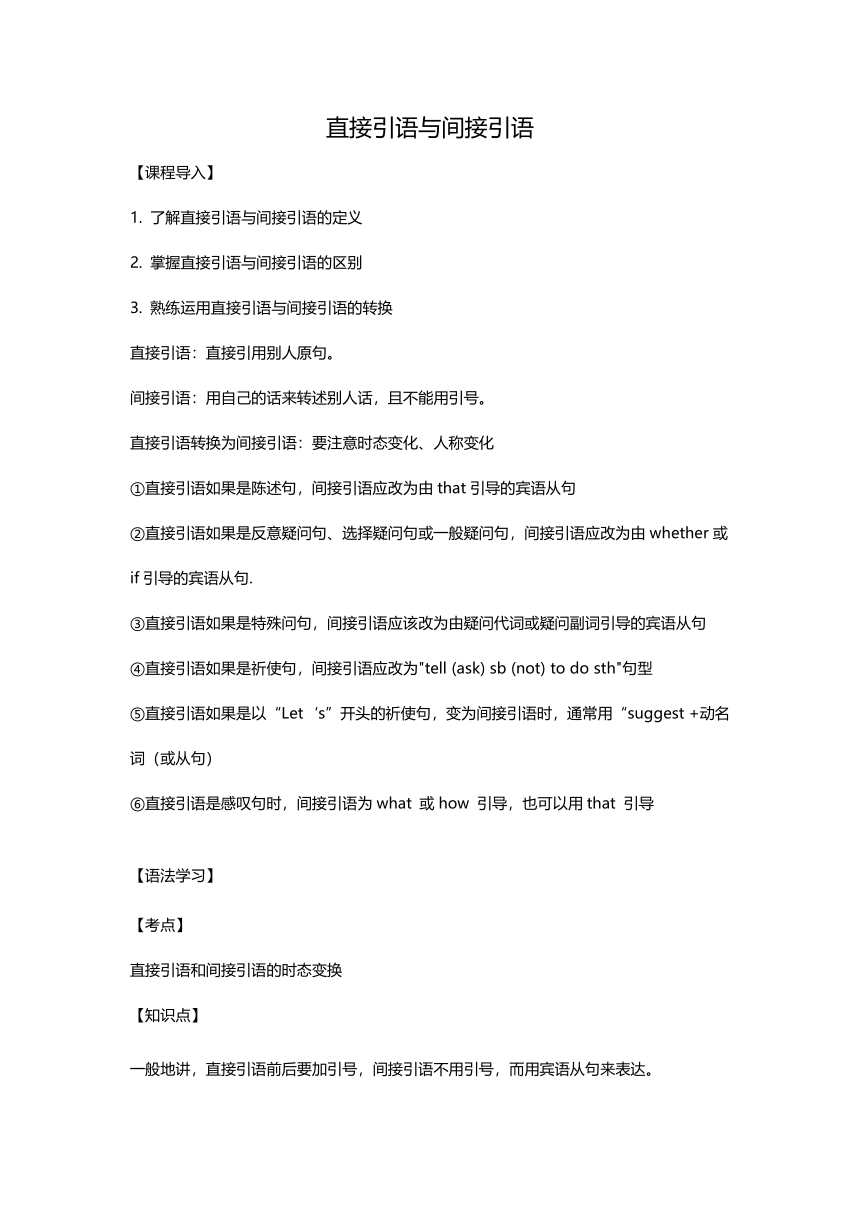
|
|
| 格式 | docx | ||
| 文件大小 | 27.0KB | ||
| 资源类型 | 试卷 | ||
| 版本资源 | 通用版 | ||
| 科目 | 英语 | ||
| 更新时间 | 2021-08-18 14:06:06 | ||
图片预览

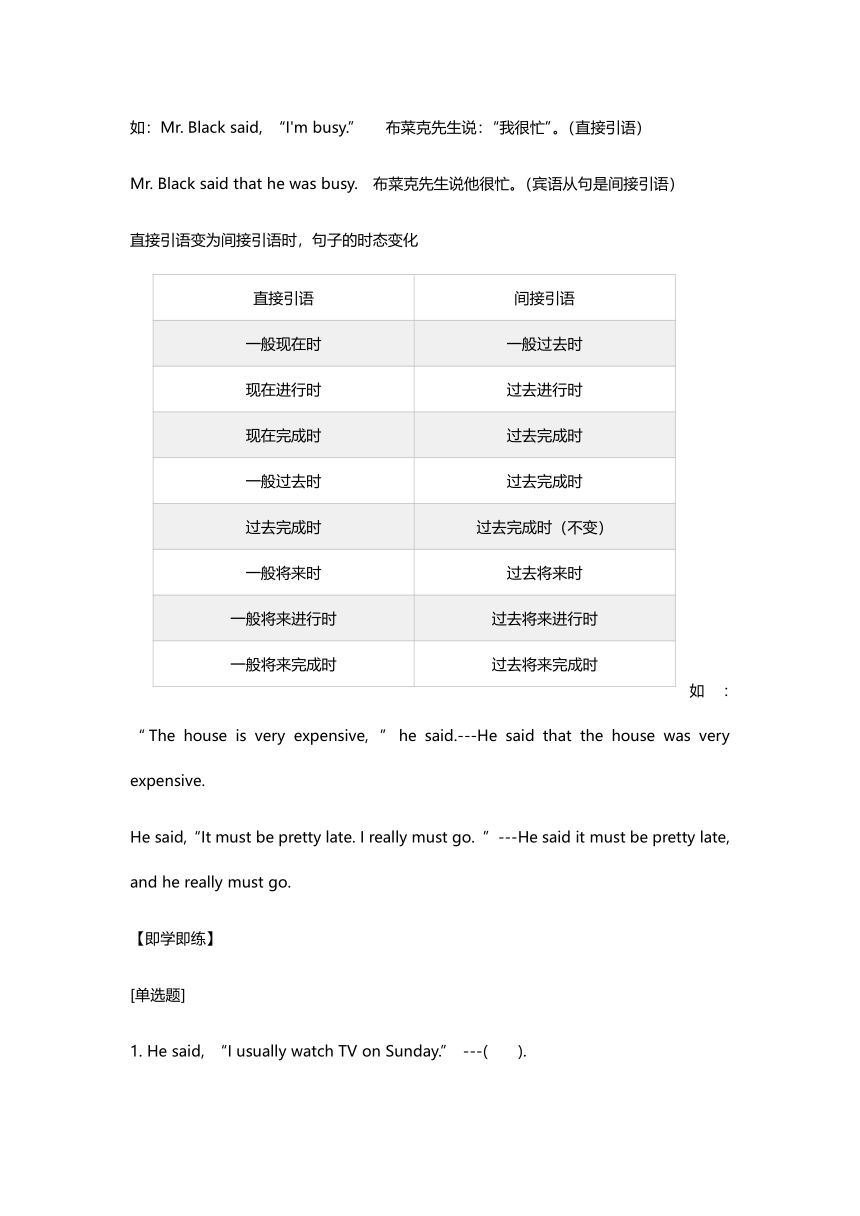
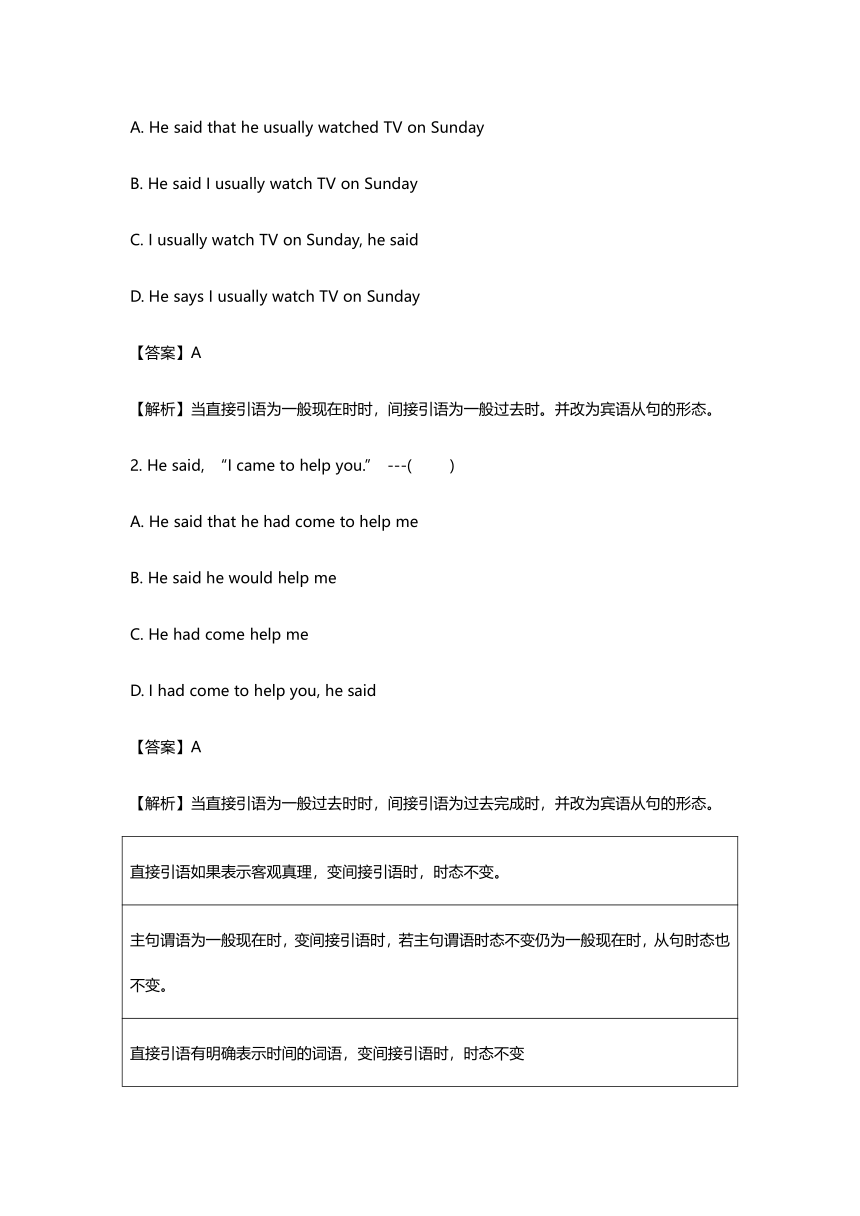
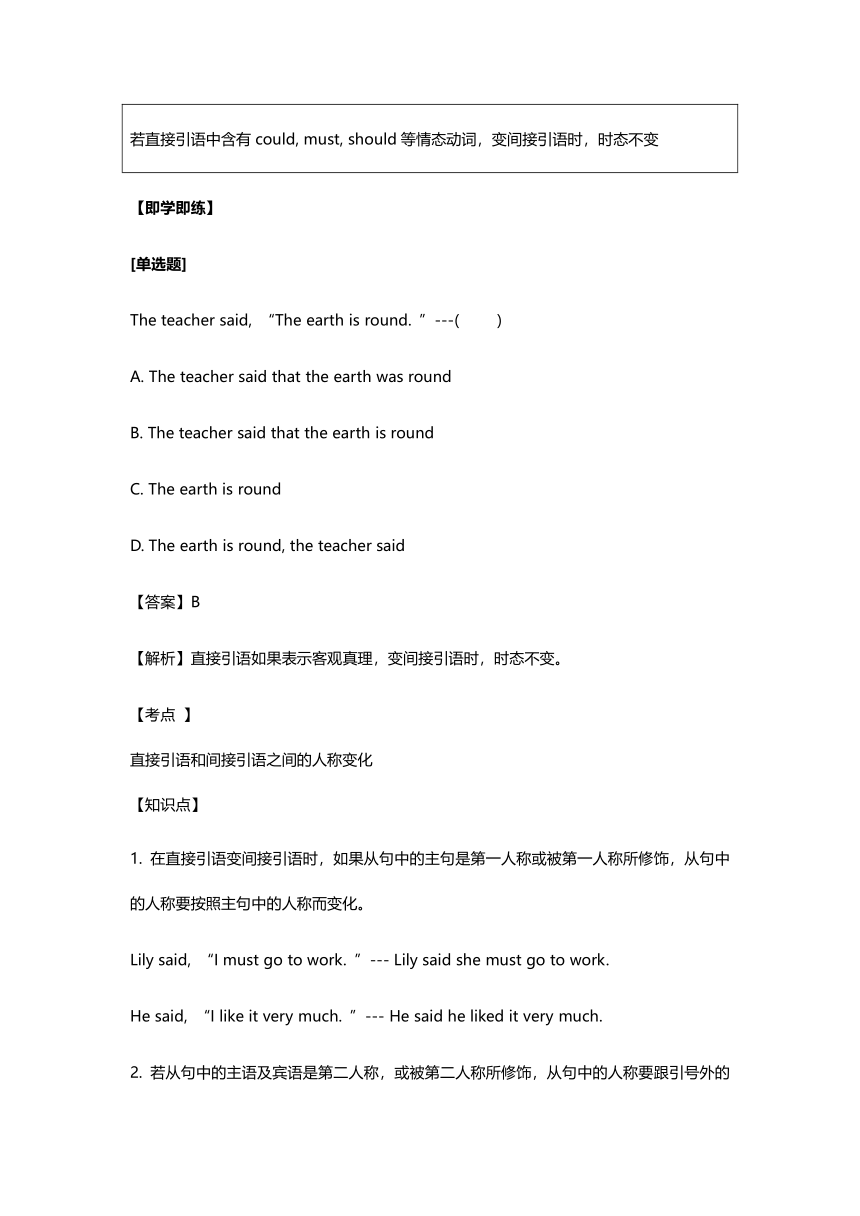
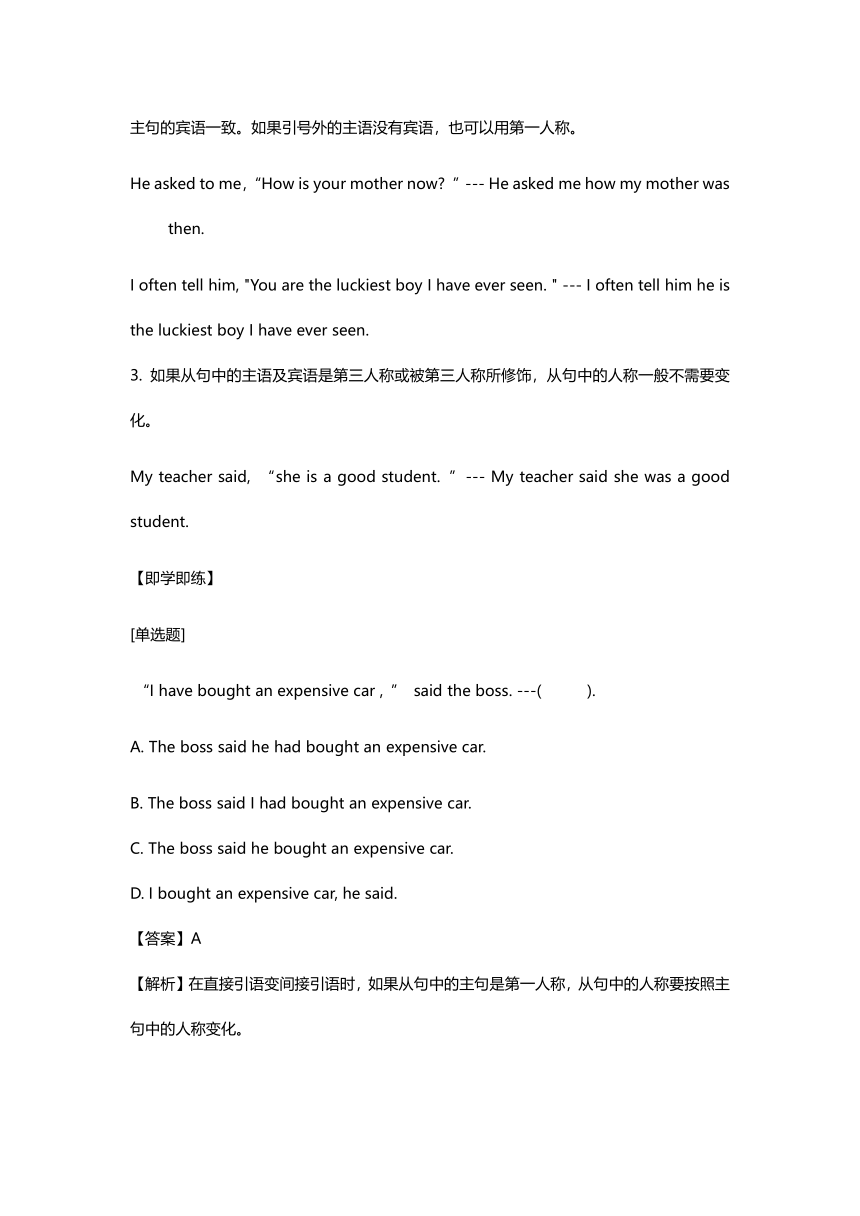
文档简介
直接引语与间接引语
【课程导入】
1. 了解直接引语与间接引语的定义
2. 掌握直接引语与间接引语的区别
3. 熟练运用直接引语与间接引语的转换
直接引语:直接引用别人原句。
间接引语:用自己的话来转述别人话,且不能用引号。
直接引语转换为间接引语:要注意时态变化、人称变化
①直接引语如果是陈述句,间接引语应改为由that引导的宾语从句
②直接引语如果是反意疑问句、选择疑问句或一般疑问句,间接引语应改为由whether或if引导的宾语从句.
③直接引语如果是特殊问句,间接引语应该改为由疑问代词或疑问副词引导的宾语从句
④直接引语如果是祈使句,间接引语应改为"tell (ask) sb (not) to do sth"句型
⑤直接引语如果是以“Let‘s”开头的祈使句,变为间接引语时,通常用“suggest +动名词(或从句)
⑥直接引语是感叹句时,间接引语为what 或how 引导,也可以用that 引导
【语法学习】
【考点】
直接引语和间接引语的时态变换
【知识点】
一般地讲,直接引语前后要加引号,间接引语不用引号,而用宾语从句来表达。
如:Mr. Black said, “I'm busy.” 布菜克先生说:“我很忙”。(直接引语)
Mr. Black said that he was busy. 布菜克先生说他很忙。(宾语从句是间接引语)
直接引语变为间接引语时,句子的时态变化
直接引语
间接引语
一般现在时
一般过去时
现在进行时
过去进行时
现在完成时
过去完成时
一般过去时
过去完成时
过去完成时
过去完成时(不变)
一般将来时
过去将来时
一般将来进行时
过去将来进行时
一般将来完成时
过去将来完成时
如:“The house is very expensive, ”he said.---He said that the house was very expensive.
He said,“It must be pretty late. I really must go. ”---He said it must be pretty late, and he really must go.
【即学即练】
[单选题]
1. He said, “I usually watch TV on Sunday.” ---( ).
A. He said that he usually watched TV on Sunday
B. He said I usually watch TV on Sunday
C. I usually watch TV on Sunday, he said
D. He says I usually watch TV on Sunday
【答案】A
【解析】当直接引语为一般现在时时,间接引语为一般过去时。并改为宾语从句的形态。
2. He said, “I came to help you.” ---( )
A. He said that he had come to help me
B. He said he would help me
C. He had come help me
D. I had come to help you, he said
【答案】A
【解析】当直接引语为一般过去时时,间接引语为过去完成时,并改为宾语从句的形态。
直接引语如果表示客观真理,变间接引语时,时态不变。
主句谓语为一般现在时,变间接引语时,若主句谓语时态不变仍为一般现在时,从句时态也不变。
直接引语有明确表示时间的词语,变间接引语时,时态不变
若直接引语中含有could, must, should等情态动词,变间接引语时,时态不变
【即学即练】
[单选题]
The teacher said, “The earth is round. ”---( )
A. The teacher said that the earth was round
B. The teacher said that the earth is round
C. The earth is round
D. The earth is round, the teacher said
【答案】B
【解析】直接引语如果表示客观真理,变间接引语时,时态不变。
【考点 】
直接引语和间接引语之间的人称变化
【知识点】
1. 在直接引语变间接引语时,如果从句中的主句是第一人称或被第一人称所修饰,从句中的人称要按照主句中的人称而变化。
Lily said, “I must go to work. ”--- Lily said she must go to work.
He said, “I like it very much. ”--- He said he liked it very much.
2. 若从句中的主语及宾语是第二人称,或被第二人称所修饰,从句中的人称要跟引号外的主句的宾语一致。如果引号外的主语没有宾语,也可以用第一人称。
He asked to me,“How is your mother now? ”--- He asked me how my mother was then.
I often tell him, "You are the luckiest boy I have ever seen. " --- I often tell him he is the luckiest boy I have ever seen.
3. 如果从句中的主语及宾语是第三人称或被第三人称所修饰,从句中的人称一般不需要变化。
My teacher said, “she is a good student. ”--- My teacher said she was a good student.
【即学即练】
[单选题]
?“I have bought an expensive car , ” said the boss. ---( ).
A. The boss said he had bought an expensive car.
B. The boss said I had bought an expensive car.
C. The boss said he bought an expensive car.
D. I bought an expensive car, he said.
【答案】A
【解析】在直接引语变间接引语时,如果从句中的主句是第一人称,从句中的人称要按照主句中的人称变化。
【考点】
时间状语,地点状语,指示代词和动词的变化
【知识点】
直接引语变为间接引语时,有些时间状语,地点状语,指示代词和动词也要作相应的变动,如下表:
直接引语
间接引语
时间状语
now 现在
then 那时;当时
时间状语
today 今天
that day 那天
时间状语
tonight 今晚
that night 那天晚上
时间状语
this week 本周
that week 那周
时间状语
yesterday昨天
the day before 前一天
时间状语
the day before yesterday 前天
two days before 前两天
时间状语
three days ago 3天前
three days before 3天前
时间状语
last week 上周
the last week 前一周
时间状语
tomorrow明天
the next day 第二天
时间状语
next week 下周
the next week 第二个星期
指示代词
this 这
that 那
指示代词
these 这些
those 那些
地点状语
here这里
there 那里
动词
come 来
go 去
【即学即练】
[单选题]
He said, “I met Jane this morning. ”---( )
A. He said that he met Jane this morning
B. He said that he had met Jane that morning.
C. That morning I met Jane, he said.
D. He said I had met Jane this morning.
【答案】B
【解析】直接引语中的this morning 在间接引语中要改为 that morning。
【知识点】
直接引语转换成间接引语时,有的变化应视实际情况而定。假如就在当天转述,today, yesterday, tomorrow等就不需要改变;如果在当地转述,here也不必改为there, come也不必改为go。
Father said, “I am free this afternoon?” ---Father said that he was free this afternoon.?
He said, “I am going there tomorrow.” --- He said that he was going there tomorrow.?
【考点】
各种句型由直接引语转变为间接引语的方法
【知识点】
直接引语是陈述句时:
陈述句由直接引语变为间接引语时,如果引述动词为现在时形式,则间接引语中的动词时、体形式不变;但若引述动词为过去时形式,则间接引语中的动词时、体形式一般就要做相应的变化。有以下几种情况:
1. 现在时间变为过去时间:指一般现在时变为一般过去时,现在进行时变为过去进行时,现在完成时变为过去完成时,以及现在完成进行时变为过去完成进行时。
He said,“the leaders are quarrelling among themselves.”--- He said (that) the leaders were quarrelling among themselves.
2. 过去时间变为过去的过去。
1)当直接引语中的一般过去时或者过去进行时是虚拟语气的用法时,在间接引语中可以不变;在有些情况下,变或者不变视意义而定。
He said,“I wish I know.” --- He said he wished he knew. (不变)
He said,“If I had any money, I’d buy you a drink. ” ---He said if he’d had any money he’d have brought me a drink. (变)
2)时间状语分句中的一般过去时或者过去完成时可以不变。
Tom said,“When I lived in London I often saw Jane.” --- Tom said when he lived in London he often saw Jane.
3) 过去完成(进行)时仍为过去完成(进行)时,无需改变。
He said,“We hadn’t returned to the store when she came.” --- He said they hadn’t returned to the store when she came.
3. 将来时间变为过去将来时间
把表示将来时间的助动词由现在时形式变为过去时形式。
1. He said,“We are spending next weekend at home.” --- He said they were spending next weekend at home.
在引述时,如果原话中的动作或者状态属于尚未到来的将来事态,那么可以不推移到过去将来时。
【即学即练】
[单选题]
1. He said,“I’d rather you lived closer to me.” ---( ).
A. He said he’d rather I lived closer to him.
B. He said I should live closer to him.
C. I’d rather lived closer to him, he said.
D. He said that I should live closer to him.
【答案】A
【解析】当直接引语中的一般过去时或者过去进行时是虚拟语气的用法时,在间接引语中可以不变。
2. He said,“I’ll be waiting for you tomorrow.”
--- ( ).
A. He said he will wait for me tomorrow.
B. He said he’ll be waiting for me tomorrow.
C. I’ll be waited by him.
D. He said that he’ll wait for me.
【答案】B
【解析】在引述时,如果原话中的动作或状态属于尚未到来的将来事态,那么可以不推移到过去将来时。
【知识点】
直接引语是疑问句时
1. 引述一般疑问句或反义疑问句时,通常用if或者whether引导,而引述选择疑问句时,通常只用whether引导。
“Does he really mean that?” --- I wondered whether / if he really meant that.
“They live in group, don’t they?” --- She asked whether / if they lived in group.
2. 特殊疑问句变为由原来的疑问词引导的宾语从句。
He asked, "Which chair shall I sit in?" ---He asked me which chair he should sit in.
3. 有的疑问句徒具形式,实际上并非提出询问,而是表示请求,提议,建议,劝告等意义。引述此类疑问句时,应借助于其他表达手段。
1)表示请求,劝告时,通常用“ask、advise、want等 + 宾语 + 不定式”结构。
"Would you buy some books?" --- He asked me to buy him some books.
“Why don't you call her first?" --- He advised me to call her first.
2) 有些表示建议时,通常用“suggest + ing分词”的结构,或者用that引导的从句,should可省略。
"Shall we get the tickets first?"
--- He suggested(us) getting the tickets first.
---He suggested that we(should)get the tickets first.
3) 表示提议时,通常用“offer + 不定式”的结构。
"Shall I post them to you?" --- He offered to post them to me.
【即学即练】
[单选题]
1. I asked him, “Will you stay at home or go to a film tonight?”
---( ).
A. I asked him that he would stay at home or go to a film that night.
B. I asked him if he would stay at home or go to a film that night.
C. I asked him whether he would stay at home or go to a film that night.
D. I asked him what he would stay at home or go to a film that night.
【答案】C
【解析】引述一般疑问句或反义疑问句时,通常用if或者whether引导,而引述选择疑问句时,通常只用whether引导。
2. “Why don’t you sent it back to the factory?” he asked.
---( ).
A. He suggested sending it back to the factory.
B. He suggested sent it back to the factory.
C. He suggested that I sending it back to the factory.
D. He suggested send it back to the factory.
【答案】A
【解析】有些表示建议时,通常用“suggest + ing分词”的结构。
【知识点】
直接引语是祈使句时
1. 引述祈使句多半采用“动词 + 宾语 + 不定式”的结构。常见的引述动词有ask、tell、beg、urge、order、warn、advise、remind等。
“Be careful with the dog." --- He warned me to be careful with the dog.
2. 引述表示命令的祈使句时,可以用“动词 + that分句”结构,分句中谓语动词通常为“be to + 不定式”或者“have got to + 不定式”。
"Don't run too fast."--- He told me that I wasn't to run too fast.
3. 引述表示建议,劝告的祈使句时,可以用“suggest, say + that 从句”或者“suggest + ing分词结构”等。
"Let's stay here till the storm has passed."--- He suggested that we(should)stay there till the storm had passed. \ He suggested us staying there till the storm had passed.
4. 引述表示提议,建议的祈使句时,也可以用"offer + 不定式"结构。
“Let us make supper for you.”---They offered to make supper for me.
【即学即练】
[单选题]
“Fill in this form.” ---( ).
A. He said not fill in this form.
B. He says I am not to fill in this form.
C. He says I had got to fill in this form.
D. He said I had got to fill in this form.
【答案】D
【解析】引述表示命令的祈使句时,分句中的谓语动词通常为“have got to + 不定式”。
【知识点】
直接引语是感叹句时
引述感叹句一般有两种方式。
1. 以what,how或者that为被引述分句的引导词。
“What a lovely day it is!" ---He remarked what a lovely day it was.
---He remarked that it was a lovely day.
2. 根据原句意义加以改写,使之变为含义相当的陈述句。
"Congratulations!" --- He congratulated me.
"How kind of you!" ---He acknowledged my kindness.
【即学即练】
[单选题]
“How well he looks!" ---( ).
A. He said how well he looked.
B. He said what well he looked.
C. How well he looks.
D. He said to me, how well he looked.
【答案】A
【解析】引述感叹句可以用what, how 或者that 为被引述分句的引导词。
【课程导入】
1. 了解直接引语与间接引语的定义
2. 掌握直接引语与间接引语的区别
3. 熟练运用直接引语与间接引语的转换
直接引语:直接引用别人原句。
间接引语:用自己的话来转述别人话,且不能用引号。
直接引语转换为间接引语:要注意时态变化、人称变化
①直接引语如果是陈述句,间接引语应改为由that引导的宾语从句
②直接引语如果是反意疑问句、选择疑问句或一般疑问句,间接引语应改为由whether或if引导的宾语从句.
③直接引语如果是特殊问句,间接引语应该改为由疑问代词或疑问副词引导的宾语从句
④直接引语如果是祈使句,间接引语应改为"tell (ask) sb (not) to do sth"句型
⑤直接引语如果是以“Let‘s”开头的祈使句,变为间接引语时,通常用“suggest +动名词(或从句)
⑥直接引语是感叹句时,间接引语为what 或how 引导,也可以用that 引导
【语法学习】
【考点】
直接引语和间接引语的时态变换
【知识点】
一般地讲,直接引语前后要加引号,间接引语不用引号,而用宾语从句来表达。
如:Mr. Black said, “I'm busy.” 布菜克先生说:“我很忙”。(直接引语)
Mr. Black said that he was busy. 布菜克先生说他很忙。(宾语从句是间接引语)
直接引语变为间接引语时,句子的时态变化
直接引语
间接引语
一般现在时
一般过去时
现在进行时
过去进行时
现在完成时
过去完成时
一般过去时
过去完成时
过去完成时
过去完成时(不变)
一般将来时
过去将来时
一般将来进行时
过去将来进行时
一般将来完成时
过去将来完成时
如:“The house is very expensive, ”he said.---He said that the house was very expensive.
He said,“It must be pretty late. I really must go. ”---He said it must be pretty late, and he really must go.
【即学即练】
[单选题]
1. He said, “I usually watch TV on Sunday.” ---( ).
A. He said that he usually watched TV on Sunday
B. He said I usually watch TV on Sunday
C. I usually watch TV on Sunday, he said
D. He says I usually watch TV on Sunday
【答案】A
【解析】当直接引语为一般现在时时,间接引语为一般过去时。并改为宾语从句的形态。
2. He said, “I came to help you.” ---( )
A. He said that he had come to help me
B. He said he would help me
C. He had come help me
D. I had come to help you, he said
【答案】A
【解析】当直接引语为一般过去时时,间接引语为过去完成时,并改为宾语从句的形态。
直接引语如果表示客观真理,变间接引语时,时态不变。
主句谓语为一般现在时,变间接引语时,若主句谓语时态不变仍为一般现在时,从句时态也不变。
直接引语有明确表示时间的词语,变间接引语时,时态不变
若直接引语中含有could, must, should等情态动词,变间接引语时,时态不变
【即学即练】
[单选题]
The teacher said, “The earth is round. ”---( )
A. The teacher said that the earth was round
B. The teacher said that the earth is round
C. The earth is round
D. The earth is round, the teacher said
【答案】B
【解析】直接引语如果表示客观真理,变间接引语时,时态不变。
【考点 】
直接引语和间接引语之间的人称变化
【知识点】
1. 在直接引语变间接引语时,如果从句中的主句是第一人称或被第一人称所修饰,从句中的人称要按照主句中的人称而变化。
Lily said, “I must go to work. ”--- Lily said she must go to work.
He said, “I like it very much. ”--- He said he liked it very much.
2. 若从句中的主语及宾语是第二人称,或被第二人称所修饰,从句中的人称要跟引号外的主句的宾语一致。如果引号外的主语没有宾语,也可以用第一人称。
He asked to me,“How is your mother now? ”--- He asked me how my mother was then.
I often tell him, "You are the luckiest boy I have ever seen. " --- I often tell him he is the luckiest boy I have ever seen.
3. 如果从句中的主语及宾语是第三人称或被第三人称所修饰,从句中的人称一般不需要变化。
My teacher said, “she is a good student. ”--- My teacher said she was a good student.
【即学即练】
[单选题]
?“I have bought an expensive car , ” said the boss. ---( ).
A. The boss said he had bought an expensive car.
B. The boss said I had bought an expensive car.
C. The boss said he bought an expensive car.
D. I bought an expensive car, he said.
【答案】A
【解析】在直接引语变间接引语时,如果从句中的主句是第一人称,从句中的人称要按照主句中的人称变化。
【考点】
时间状语,地点状语,指示代词和动词的变化
【知识点】
直接引语变为间接引语时,有些时间状语,地点状语,指示代词和动词也要作相应的变动,如下表:
直接引语
间接引语
时间状语
now 现在
then 那时;当时
时间状语
today 今天
that day 那天
时间状语
tonight 今晚
that night 那天晚上
时间状语
this week 本周
that week 那周
时间状语
yesterday昨天
the day before 前一天
时间状语
the day before yesterday 前天
two days before 前两天
时间状语
three days ago 3天前
three days before 3天前
时间状语
last week 上周
the last week 前一周
时间状语
tomorrow明天
the next day 第二天
时间状语
next week 下周
the next week 第二个星期
指示代词
this 这
that 那
指示代词
these 这些
those 那些
地点状语
here这里
there 那里
动词
come 来
go 去
【即学即练】
[单选题]
He said, “I met Jane this morning. ”---( )
A. He said that he met Jane this morning
B. He said that he had met Jane that morning.
C. That morning I met Jane, he said.
D. He said I had met Jane this morning.
【答案】B
【解析】直接引语中的this morning 在间接引语中要改为 that morning。
【知识点】
直接引语转换成间接引语时,有的变化应视实际情况而定。假如就在当天转述,today, yesterday, tomorrow等就不需要改变;如果在当地转述,here也不必改为there, come也不必改为go。
Father said, “I am free this afternoon?” ---Father said that he was free this afternoon.?
He said, “I am going there tomorrow.” --- He said that he was going there tomorrow.?
【考点】
各种句型由直接引语转变为间接引语的方法
【知识点】
直接引语是陈述句时:
陈述句由直接引语变为间接引语时,如果引述动词为现在时形式,则间接引语中的动词时、体形式不变;但若引述动词为过去时形式,则间接引语中的动词时、体形式一般就要做相应的变化。有以下几种情况:
1. 现在时间变为过去时间:指一般现在时变为一般过去时,现在进行时变为过去进行时,现在完成时变为过去完成时,以及现在完成进行时变为过去完成进行时。
He said,“the leaders are quarrelling among themselves.”--- He said (that) the leaders were quarrelling among themselves.
2. 过去时间变为过去的过去。
1)当直接引语中的一般过去时或者过去进行时是虚拟语气的用法时,在间接引语中可以不变;在有些情况下,变或者不变视意义而定。
He said,“I wish I know.” --- He said he wished he knew. (不变)
He said,“If I had any money, I’d buy you a drink. ” ---He said if he’d had any money he’d have brought me a drink. (变)
2)时间状语分句中的一般过去时或者过去完成时可以不变。
Tom said,“When I lived in London I often saw Jane.” --- Tom said when he lived in London he often saw Jane.
3) 过去完成(进行)时仍为过去完成(进行)时,无需改变。
He said,“We hadn’t returned to the store when she came.” --- He said they hadn’t returned to the store when she came.
3. 将来时间变为过去将来时间
把表示将来时间的助动词由现在时形式变为过去时形式。
1. He said,“We are spending next weekend at home.” --- He said they were spending next weekend at home.
在引述时,如果原话中的动作或者状态属于尚未到来的将来事态,那么可以不推移到过去将来时。
【即学即练】
[单选题]
1. He said,“I’d rather you lived closer to me.” ---( ).
A. He said he’d rather I lived closer to him.
B. He said I should live closer to him.
C. I’d rather lived closer to him, he said.
D. He said that I should live closer to him.
【答案】A
【解析】当直接引语中的一般过去时或者过去进行时是虚拟语气的用法时,在间接引语中可以不变。
2. He said,“I’ll be waiting for you tomorrow.”
--- ( ).
A. He said he will wait for me tomorrow.
B. He said he’ll be waiting for me tomorrow.
C. I’ll be waited by him.
D. He said that he’ll wait for me.
【答案】B
【解析】在引述时,如果原话中的动作或状态属于尚未到来的将来事态,那么可以不推移到过去将来时。
【知识点】
直接引语是疑问句时
1. 引述一般疑问句或反义疑问句时,通常用if或者whether引导,而引述选择疑问句时,通常只用whether引导。
“Does he really mean that?” --- I wondered whether / if he really meant that.
“They live in group, don’t they?” --- She asked whether / if they lived in group.
2. 特殊疑问句变为由原来的疑问词引导的宾语从句。
He asked, "Which chair shall I sit in?" ---He asked me which chair he should sit in.
3. 有的疑问句徒具形式,实际上并非提出询问,而是表示请求,提议,建议,劝告等意义。引述此类疑问句时,应借助于其他表达手段。
1)表示请求,劝告时,通常用“ask、advise、want等 + 宾语 + 不定式”结构。
"Would you buy some books?" --- He asked me to buy him some books.
“Why don't you call her first?" --- He advised me to call her first.
2) 有些表示建议时,通常用“suggest + ing分词”的结构,或者用that引导的从句,should可省略。
"Shall we get the tickets first?"
--- He suggested(us) getting the tickets first.
---He suggested that we(should)get the tickets first.
3) 表示提议时,通常用“offer + 不定式”的结构。
"Shall I post them to you?" --- He offered to post them to me.
【即学即练】
[单选题]
1. I asked him, “Will you stay at home or go to a film tonight?”
---( ).
A. I asked him that he would stay at home or go to a film that night.
B. I asked him if he would stay at home or go to a film that night.
C. I asked him whether he would stay at home or go to a film that night.
D. I asked him what he would stay at home or go to a film that night.
【答案】C
【解析】引述一般疑问句或反义疑问句时,通常用if或者whether引导,而引述选择疑问句时,通常只用whether引导。
2. “Why don’t you sent it back to the factory?” he asked.
---( ).
A. He suggested sending it back to the factory.
B. He suggested sent it back to the factory.
C. He suggested that I sending it back to the factory.
D. He suggested send it back to the factory.
【答案】A
【解析】有些表示建议时,通常用“suggest + ing分词”的结构。
【知识点】
直接引语是祈使句时
1. 引述祈使句多半采用“动词 + 宾语 + 不定式”的结构。常见的引述动词有ask、tell、beg、urge、order、warn、advise、remind等。
“Be careful with the dog." --- He warned me to be careful with the dog.
2. 引述表示命令的祈使句时,可以用“动词 + that分句”结构,分句中谓语动词通常为“be to + 不定式”或者“have got to + 不定式”。
"Don't run too fast."--- He told me that I wasn't to run too fast.
3. 引述表示建议,劝告的祈使句时,可以用“suggest, say + that 从句”或者“suggest + ing分词结构”等。
"Let's stay here till the storm has passed."--- He suggested that we(should)stay there till the storm had passed. \ He suggested us staying there till the storm had passed.
4. 引述表示提议,建议的祈使句时,也可以用"offer + 不定式"结构。
“Let us make supper for you.”---They offered to make supper for me.
【即学即练】
[单选题]
“Fill in this form.” ---( ).
A. He said not fill in this form.
B. He says I am not to fill in this form.
C. He says I had got to fill in this form.
D. He said I had got to fill in this form.
【答案】D
【解析】引述表示命令的祈使句时,分句中的谓语动词通常为“have got to + 不定式”。
【知识点】
直接引语是感叹句时
引述感叹句一般有两种方式。
1. 以what,how或者that为被引述分句的引导词。
“What a lovely day it is!" ---He remarked what a lovely day it was.
---He remarked that it was a lovely day.
2. 根据原句意义加以改写,使之变为含义相当的陈述句。
"Congratulations!" --- He congratulated me.
"How kind of you!" ---He acknowledged my kindness.
【即学即练】
[单选题]
“How well he looks!" ---( ).
A. He said how well he looked.
B. He said what well he looked.
C. How well he looks.
D. He said to me, how well he looked.
【答案】A
【解析】引述感叹句可以用what, how 或者that 为被引述分句的引导词。
同课章节目录
- 词法
- 名词
- 动词和动词短语
- 动词语态
- 动词时态
- 助动词和情态动词
- 非谓语动词
- 冠词
- 代词
- 数词和量词
- 形容词副词及其比较等级
- 介词和介词短语
- 连词和感叹词
- 构词法
- 相似、相近词比较
- 句法
- 陈述句
- 一般疑问句和否定疑问句
- 特殊疑问句及选择疑问句
- 反意疑问句
- 存在句(There be句型)
- 宾语从句
- 定语从句
- 状语从句
- 主谓一致问题
- 简单句
- 并列句
- 复合句
- 主谓一致
- 主、表语从句
- 名词性从句
- 直接引语和间接引语
- 虚拟语气
- 感叹句
- 强调句
- 倒装句
- 祈使句
- 句子的成分
- 句子的分类
- 题型专区
- 单项选择部分
- 易错题
- 完形填空
- 阅读理解
- 词汇练习
- 听说训练
- 句型转换
- 补全对话
- 短文改错
- 翻译
- 书面表达
- 任务型阅读
- 语法填空
- 其他资料
